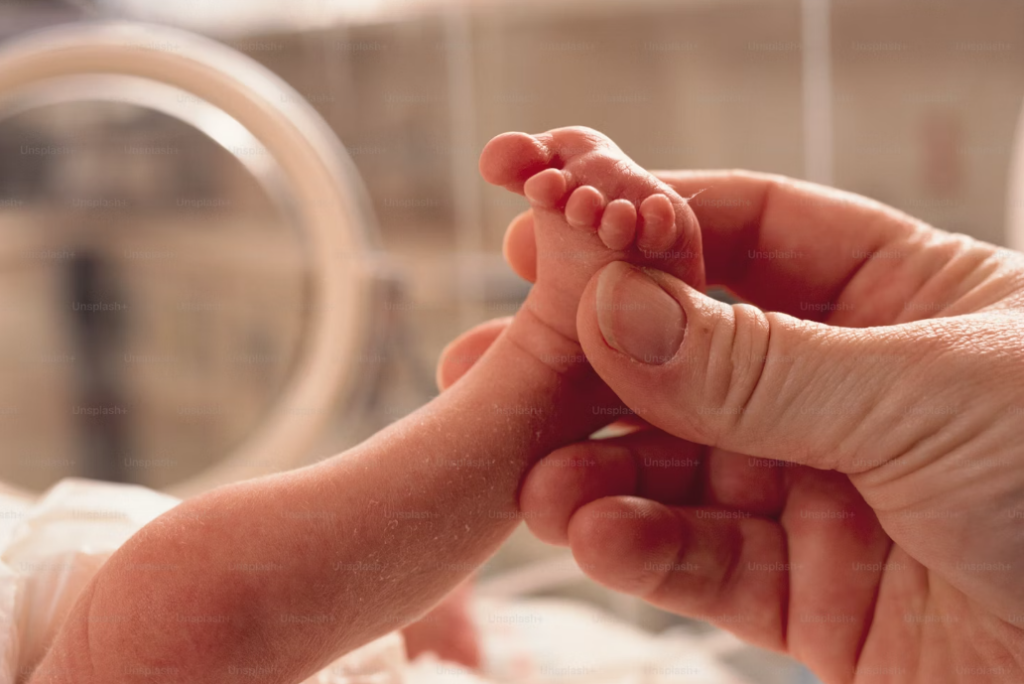
The Preterm (premature) Birth Service
The Preterm Birth team are based at the Lister Hospital but have clinics that run at the Lister and at Hertford County Hospital. The service is for women who have been identified as being at higher risk of having a preterm (premature) birth. We hope this webpage will be helpful in understanding the risk factors and how the Preterm Birth team will support you during pregnancy to try and reduce the risk of preterm birth.
What is preterm birth?
We normally expect babies to be born between 37-42 weeks of pregnancy. When babies are born before 37 weeks, this is known as a preterm (premature) birth.
About 8 out of 100 babies will be born prematurely before 37 weeks.
Premature babies have a higher chance of having health problems, particularly with breathing and feeding. They are also at increased risk of infection. The earlier a baby is born, the more vulnerable they are and they may need to be looked after in the neonatal unit. However, more than nine out of ten premature babies born after 28 weeks survive and only a small number will have serious long-term disabilities.
Please see the infographic on outcomes for babies born before 26 weeks.
What causes preterm birth?
The cause of preterm labour and birth is usually unknown. In most cases, doctors can not predict which women will go into labour early, but certain factors are known to increase the risk of premature labour and a combination of several of these factors can be involved.
If you have been identified as having any risk factors for premature birth then the midwife at your booking appointment will refer you to the Preterm Birth team. The Preterm Birth team will go through your referral and decide if you need an appointment and what type of appointment this may be. The team may also contact you to ask some questions to ensure you are given the right appointment at the right time.
What if you think you are in preterm labour?
If you think you are in preterm labour or that your waters have broken, please contact Lister Hospital:
- Less than 20 weeks pregnant, contact the Early Pregnancy Unit (EPU—Woodlands) on 01438 286190 (or attend the emergency department if urgent).
- Over 20 weeks, telephone the Maternity Triage on 01438 286168.
There are treatments which we can sometimes offer in an attempt to stop premature labour or to reduce the risk of complications to baby if you do give birth early. This all depends on the gestation that this occurs and also if there are any other complications such as infection. The healthcare team can discuss this with you at the time.
If labour is not confirmed, you should be able to go home assuming you are well and there are no other concerns for you or your baby. We will make arrangements to see you again if you need more assessments at a later date.
Pregnancy charity Tommy’s has created a useful resource for signs and symptoms of premature labour
Supporting you if you are in preterm labour:
If you are more than 24 weeks pregnant and we think that there is a very high chance that you may birth your baby within the next week, you will be advised to stay in hospital. You may also be offered some medications to help with your baby’s development and to reduce the chance of complications caused by being born early.
If your waters have been confirmed as broken (known as Preterm Prelabour Rupture of Membranes or PPROM), then we will advise that you stay in hospital for at least 48 hours as there is a chance that you could go into labour.
Please follow this link to the PPROM leaflet for more information on how we manage PPROM.
Right place of birth
Here at the Lister, the level two neonatal unit is best equipped to appropriately care for babies that are born over 27 weeks, (or over 28 weeks for twins) and babies who are estimated to weigh over 800g at birth. If your baby is less than 27 weeks, (less than 28 weeks for twins) or estimated to weigh less than 800g, then we will discuss with you about transferring you to a hospital that has a level three neonatal unit that is better equipped to provide the best care for your baby/babies. Ideally, if we do transfer you, this would occur before the birth so that preparations can be made to give them the best start. This is known as an in-utero transfer.
Neonatal Services at the Lister
If your baby is born prematurely, they may need to stay in the neonatal unit for some time depending on their gestation at birth.
The neonatal team will be able to support you on your journey. A Family Support nurse from the neonatal team would be happy to speak to you to answer any questions you have. They can even facilitate a virtual or face to face tour of the neonatal unit at the Lister. You can contact them via email on enh-tr.neonatalfamilysupport@nhs.net. They aim to respond within 3-5 working days.
Contacting the Preterm Birth team
Our preterm birth team are available by email pretermbirth.enh-tr@nhs.net. They aim to respond within 3-5 working days.
You can also contact the Preterm Birth Midwife by telephone on 07920 762047 (Monday-Thursday 9am-5pm and Friday 1.30-5pm). She can answer any questions you may have or direct you to other services.
Other useful resources
There are some webpages that can offer more information to support you:
Tommy’s – Pregnancy charity
https://www.tommys.org/pregnancy-information/premature-birth
Bliss Charity – Premature baby charity
https://www.bliss.org.uk/parents/having-another-baby
Little Heartbeats Charity for PPROM
https://www.little-heartbeats.org.uk/